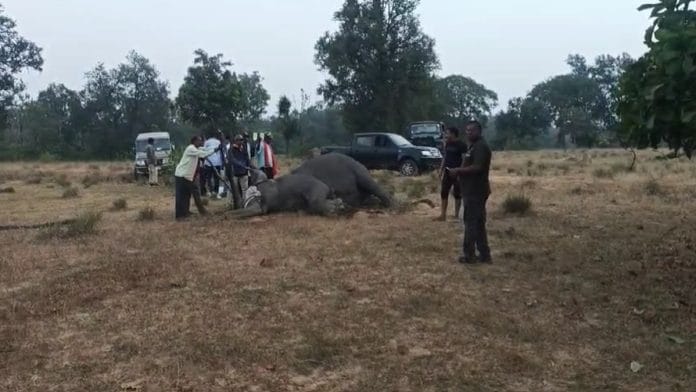Bhopal: Preliminary findings suggest that toxicity was the cause of eight elephant deaths in Madhya Pradesh’s Bandhavgarh National Park as a large amount of kodo were found inside the stomach of one of the tuskers during post-mortem, ThePrint has learnt.
The autopsy of the elephant was conducted Wednesday, and a detailed report is awaited.
Samples of the millet collected from the carcass and from the fields where the elephant herd had grazed would be examined to ascertain whether deaths could have been due to poisoning from fungus-infected kodo and kutki (millet) crops, according to sources in the MP forest department.
Initially, nine from a herd of 13 elephants were affected, with four found dead in the Khitauli core zone on Tuesday afternoon. Later another three succumbed followed by one more on Wednesday evening.
The herd was at a tri-junction area of Pataur, Khitauli (core zone), and Panpatha (buffer zone), close to villages The elephants were said to be moving Monday night from Bagaiya, Badwai towards Salkaniya. The pachyderms were shooed away by Salkaniya locals, after they had grazed on the standing Kodo crop on the fields as well as those bundled away after being harvested.
“There have been previous cases of kodo poisoning adversely affecting elephants. It is also found that kodo after rains develops a certain fungus which could be the source of poisoning in elephants. But, nothing can be said for certain unless the samples sent from the fields and the stomach of elephants confirm the same,” Principal Chief Conservator of Forests (Wildlife) Vijay N. Ambade told ThePrint on Wednesday.
Ambade has also appointed a five-member team of senior forest officers to investigate the deaths of these nine tuskers and submit their report within 10 days.
Another possibility that was being looked at was poisoning through drinking water contaminated with pesticides. But, a team of senior forest officers reached the nearest water body and ruled it out considering no other animals were found affected in the area.
The fields were found with stacks of kodo that were damaged and eaten by elephants. As the officers were carrying out an investigation on Wednesday, a herd of another 23 elephants reached the spot and had to be shooed away. Subsequently, patrolling teams and forest guards have been deployed in the area to keep the elephants away.
To avoid a repeat of such disaster, forest officers were working out on suggestions that include persuading the farmers to burn their yield of kodo for which they would be compensated.
“We are looking at all possibilities and tomorrow (Friday) after deliberations, necessary steps will be taken,” Ambade added.
An expert team formed by the Wildlife Crime Control Bureau (WCCB), a statutory multi-disciplinary body under the Ministry of Environment and Forests, is already in Bandhavgarh to oversee the investigation.
“This (death of pachyderms) has become a national issue… Going by the experience of the Madhya Pradesh government, a national guideline (to avoid such fatalities) may have to be issued,” a senior forest officer told ThePrint.
Senior Congress leader Jairam Ramesh, a former Union environment minister, were among the prominent voices who sought a detailed inquiry.
Wildlife activist Ajay Dubey had earlier told ThePrint, “These animals are not new to these crops and it has to be a really huge amount of toxins to cause the death of such large animals. Only a magisterial or a CBI inquiry will ascertain was truly transpired.”
Though Bandhavgarh is known for tigers, elephants are also a major part of its wildlife. Elephants were said to have made a return to the national park after a herd was spotted in 2018. Prior to this, there were no sightings of the tuskers there for decades.
(Edited by Tony Rai)
Also Read: India’s 1st woman mahout not a fan of tranquilizers to tame elephants. Wants old ways back






